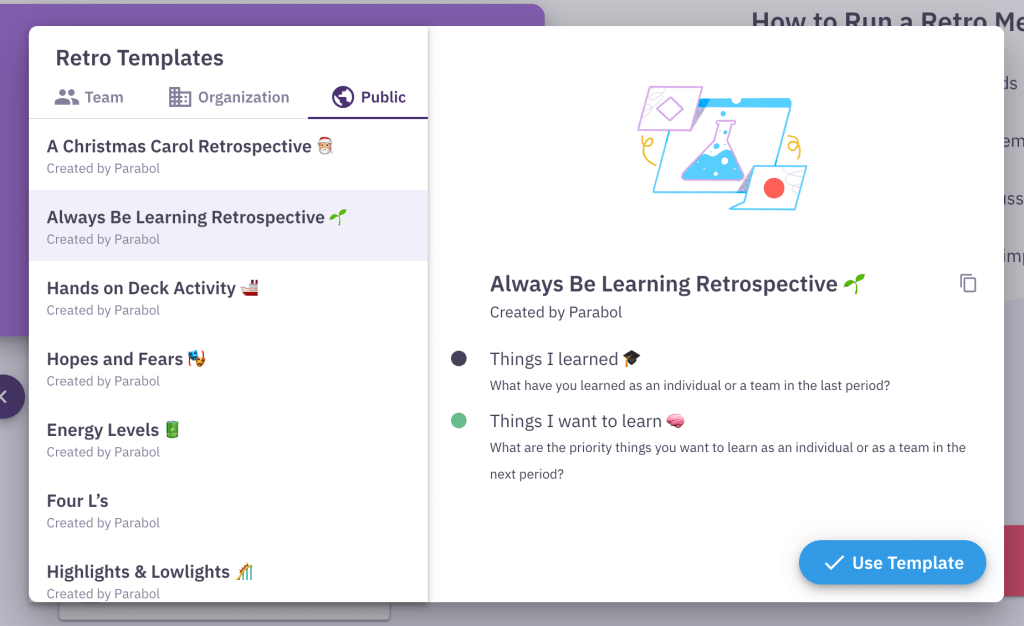Always Be Learning Retrospective
A team or personal retrospective focused on growth

What is an Always Be Learning retrospective?
The Always Be Learning retrospective helps you talk about your individual differences, so you can help understand each other better, and collaborate more effectively.
You probably think of your team as a unified group, working together towards common goals.
That’s a beautiful thing! But it’s also important to think about who you are as individuals.
No matter how flawlessly you work together, your scrum team is made up of complex human beings. And you each have your own goals, interests, and learning styles.
The Always Be Learning retrospective might help you discover ways to learn from each other. If Savi learned Javscript last year, and that’s one of Matt’s upcoming goals, that’s an ideal chance to work together!
Here are the prompts for an Always Be Learning retrospective meeting:
Things I learned
We learn technical skills at work, like Javascript and SEO optimization. But soft skills, like self-care and stress management, are just as important.
This prompt is your space to share both. Encourage the whole team to throw in personal insights, tricks of the trade, or even fun things they’ve learned about their coworkers. That will keep the retro fun, entertaining, and lighthearted.
Example: I learned some CSS this year, to help the marketing team with the new iteration of our website. That was really something fun and different!
Things I want to learn
Think of this prompt as your learning wishlist. Your team should list out everything they’d love to learn next year or in the next sprint, whether big or small. Continuous improvement is all about learning, so this is the time to think boldly!
These wishes could be existing skills they’d like to build on, or entirely new areas to explore!
Wherever possible, create action items from this prompt. Then, your agile team can start planning to learn these new skills.
Example: I want to spend some time working on my written communication. Since working remotely, I realized how important it is to communicate clearly – it helps avoid a backlog of confusing messages!
When to do an Always Be Learning retrospective
Always be Learning retrospectives are perfect at the end of the year, for personal retrospectives, for team retrospectives, and for mentoring, coaching, or one-on-one conversations.
At the end of the year
This retro looks back at the current year and forward at the next one. So, it’s perfect around December or January!
Often, year-end means a slowdown, or time off for the holidays. That makes it a perfect chance for a scrum retrospective that’s personal, rather than sprint- or project-focused.
For personal retrospectives
Retros don’t have to happen with a team! Looking back on your own is valuable, too.
Try out Always Be Learning solo at the end of the year – or anytime you need a tool for personal and professional growth.
For team retrospectives, anytime
The Always Be Learning retrospective can be a great retro for team learning any time of the year. Try running it once per quarter or in-line with your OKR cycles.
The facilitator can just easily make this a sprint retrospective, or a way to look back on a project. Just update the prompts to reference your upcoming, and last sprint or project!
In mentoring relationships or one-on-ones
Mentors exist to help us learn and grow. Chances are you have a team lead or mentor within or outside your company.
The Always Be Learning retrospective is a helpful activity for setting learning goals with your team lead, manager, or mentor. Once you’ve written down your learning achievements and goals, you can create an action plan together.
How to run an Always Be Learning retrospective in Parabol
Sign up to Parabol for free retrospectives. Don’t worry, it’s free! Then, from your Parabol dashboard hit the Add New Meeting button.
Select the Always Be Learning retrospective template
Select Retro Meeting with the arrows, then use the dropdown to select the Always Be Learning retrospective.
Here’s where you can find all of Parabol’s built-in retrospective templates, including other learning focused retrospectives such as start stop continue, mountain climber retrospective, and the what went well retrospective, among other retrospective ideas. Why not bookmark one of these for your next retrospective?
To help team members get to know each other, the meeting facilitator, scrum master, or agile coach may want to remove anonymity. That way, people can really own, and share, what they’ve learned.

Start your Always Be Learning retro with an Icebreaker
The Icebreaker box is checked on by default. You don’t have to do one, but we recommend it. A good icebreaker is the prelude to a great retrospective and can loosen everyone up.
When you’re ready, the facilitator should hit Start Meeting to kick things off!
If you’re doing an Icebreaker, you’ll have a random question to answer. You can refresh it if you want another option, and of course you can create your own if you want.

Next, you’ll reflect on your work together using the Always be Learning prompts.
Remember, Parabol is a remote-friendly online retrospective tool that enables you to run asynchronous retrospectives with your team.
Reflect, Group, and Discuss topics based on the Always Be Learning prompts
After the reflect phase, you’ll vote on issues to discuss, talk about the most voted on items, and then get a summary of the retro when you’re done.
Parabol is remote-friendly, enabling you to work asynchronously with your team. Your scrum team can all leave comments synchronously, or do it at a time that works for them.
Also, reflections are anonymous, and no one can see them until you’re done working on them.
After the reflect phase, you’ll vote on issues to discuss, talk about the most voted on items, and then get a summary of the retro and any action items when you’re done. Make sure to review the retro 101 guide for tips on running a great agile retrospective.